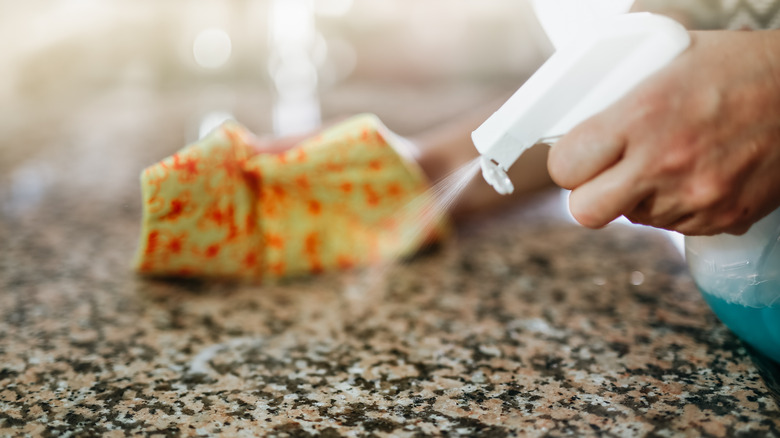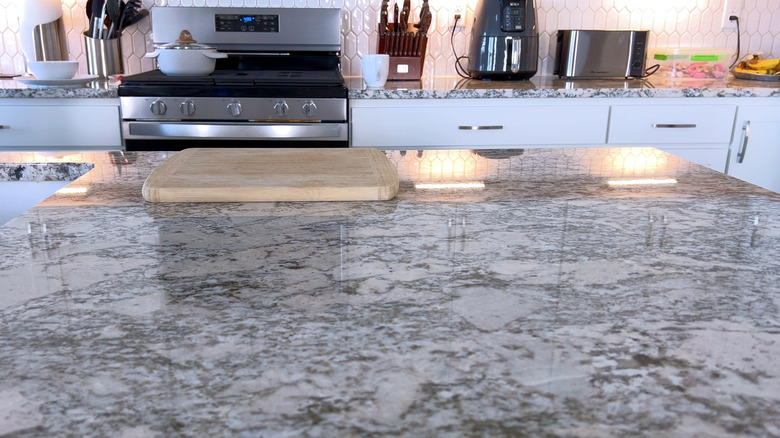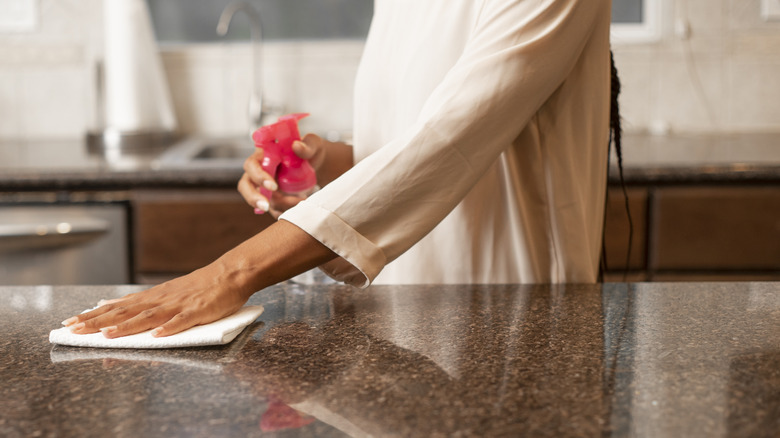Is It Safe To Use Borax On Granite Countertops? Here's What You Should Know
Granite is a classic, popular countertop material for good reason. It's a stunning natural material but harder and more durable than similar types of natural stone like marble. That means it can be cleaned easier, with a greater variety of products, than softer, more porous countertops. While researching what products to use on your granite countertops, you may see some tips saying borax is a good choice. Borax is a naturally-occurring substance used as a cleaner for centuries, but it's seen a resurgence in popularity thanks to the viral laundry stripping hack. Although borax is a versatile cleaning product that can be applied safely to surfaces like glass and porcelain, we don't recommend applying it on granite.
Borax is the common name for sodium tetraborate, a mineral compound of sodium, oxygen, and boron found in desert plains. The sodium makes it a similar compound to salt, but the boron is responsible for most of its stain-fighting and cleaning powers. Though it is simple and natural, borax is highly alkaline, which can damage granite countertops.
How borax damages granite
People love using granite because it is so durable and relatively easy to maintain compared to other natural stones. However, you can't use just anything to clean it. You may already know that vinegar and other acidic cleaning products shouldn't be used on granite, but the same is true for cleaning products on the opposite end of the pH spectrum. Granite is acid and alkaline-sensitive, meaning that products high or low on the pH scale can damage it. Borax typically has a pH of approximately 9.24, making it a strong alkaline substance that can cause what's known as etching. Alkaline etching causes the surface of the granite to look dull, scratched, faded, and otherwise discolored, ruining the finish of your glossy, beautiful granite countertop.
What is etching and how does it differ from regular scratches? Etching is a result of a chemical reaction, while scratches and dings are physical. The longer the granite countertop is exposed to the alkaline cleaning product, the worse and more noticeable the etching can become. Over time, etching can lead to more severe etching as this is a sign of the stone deteriorating. That's why it's essential to use the right kinds of cleaning products to keep your granite countertops in pristine condition.
The best cleaners for granite
The good news is there are plenty of commercial cleaners specifically formulated to safely clean granite. Of course, most detergents specifically labeled and formulated for granite are likely safe bets, but if you can't find one, you can still find a good choice. The biggest thing you need to look for is a pH neutral solution, meaning neither acidic nor alkaline, as this prevents any chemical reactions that may result in etching. If you're not sure how to get started, look for daily-use pH-neutral stone cleaners online or ask one of the employees of your local hardware store, and they should be able to point you in the right direction. With a daily granite cleaning spray sorted, you should be able to keep your granite safe and clean with regular cleaning.
If your granite countertop has alkaline etch marks from borax use, you may be able to repair some of the damage by using a mild acid on it. Mild acids include acetic acid, the active ingredient found in cleaning vinegar. By using a mildly acidic solution, you can neutralize the alkaline etchings. Be careful not to allow the acid to sit too long, as this can damage your granite counters. Keep in mind, you may need to re-hone and re-polish if the etching is severe enough — since these aren't easy (or cheap) repairs to make, we recommend avoiding using borax on granite countertops in the first place.


